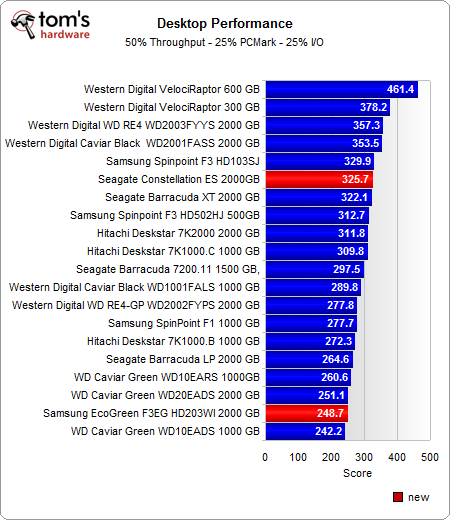Two 2TB Hard Drives For Storage Applications, Reviewed
Samsung and Seagate are each offering new high-capacity drives that strive to cram tons of data into a 3.5" form factor. Today's battle is the eco-friendly Spinpoint against the nearline Constellation, low power against business-class. Which one is best?
Get Tom's Hardware's best news and in-depth reviews, straight to your inbox.
You are now subscribed
Your newsletter sign-up was successful
Conclusion
Our desktop performance index provides a useful summary and overview on the performance characteristics of both hard drives reviewed here. Seagate’s Constellation ES is much faster than the Samsung Spinpoint F3EG. The Constellation ES slightly outperforms the Barracuda XT, but the two are comparable overall. The Spinpoint F3EG is Samsung’s first 2TB hard drive, but it still underperforms the Spinpoint F3 (without the EG suffix). Instead, the drive seems better suited to low power consumption.
Samsung vs. Seagate
If you're mainly looking for a reliable archiving and high capacity storage drive without specific performance targets in mind, then you’ve found an excellent option. Samsung's drive is huge, cool, quiet, and low on power.
In turn, Seagate’s Constellation ES is the much faster drive that may be able to meet performance demands unreachable by Samsung’s 2TB drive. Keep an eye on the WD Caviar Black or RE4 drives, as well, as these are occasionally faster than the Constellation ES.
Be Aware of Sharp Segmentation
Also note that neither drive does particularly well at delivering an impressive amount of I/O operations per second. We can’t help but assume that Samsung and Seagate stopped optimizing their 3.5” high-capacity drives for applications and I/O-intensive workloads. This makes sense, since faster 2.5” drives and SSDs in particular are significantly faster at random operations. But it's very important to be fully aware of this situation. As a consequence, it will be even more important to look at performance numbers before purchasing hard drives. I’d like to be sure that my new drives are a good match for the intended purpose.
Cost? Now We’re Talking
Get Tom's Hardware's best news and in-depth reviews, straight to your inbox.
Last but not least, there's cost to consider. The Constellation ES 2TB SATA is available at $300 and up, which equals $0.15 per gigabyte. Frankly, this is a lot of money, even for a business-class drive with a five-year warranty. If you were to purchase four drives for a storage solution, you’d hit $1,200. Knowing that Samsung’s Spinpoint F3EG is only $150 (albeit with a three-year warranty with much lower MTBF), you would spend $600.
Personally, I'd probably purchase the Samsung drives for half of Seagate's price and get myself one or two spare drives as replacements in a RAID 5 or 6 array. The cheaper option is acceptable because I'm a consumer and I can live with downtime. In the business segment, though, I wouldn't take the risk, and would go with the Constellations.
